| We are delighted that the article “Making a good career choice: A decision-analytical intervention to enhance proactive decision-making and career choice self-efficacy in high school students” by Prof. Johannes Siebert, Dr. Nadine Oeser, and Dr. Maxi Becker was awarded the Best Research Paper 2023 by the renowned Decision Sciences Journal of Innovative Education. In previous studies, Siebert/Kunz/Rolf (2020, 2021) demonstrated the effectiveness of decision-making skills training for students and managers. Taken together, the studies allow the conclusion that proactive cognitive decision-making skills can be improved through decision-making skills training and, as a result, participants experience greater self-efficacy and are more satisfied with their lives. Motivated by these research results, Prof. Siebert wanted to investigate the effectiveness of KLUG-decision-making competence training in analogy to these studies. Further details can be found here: https://www.mci.edu/en/news-filter-en/193-studyprogram-news/news-business-management-en/5453-best-paper-award-decision-sciences |
Category: Blog-en
-
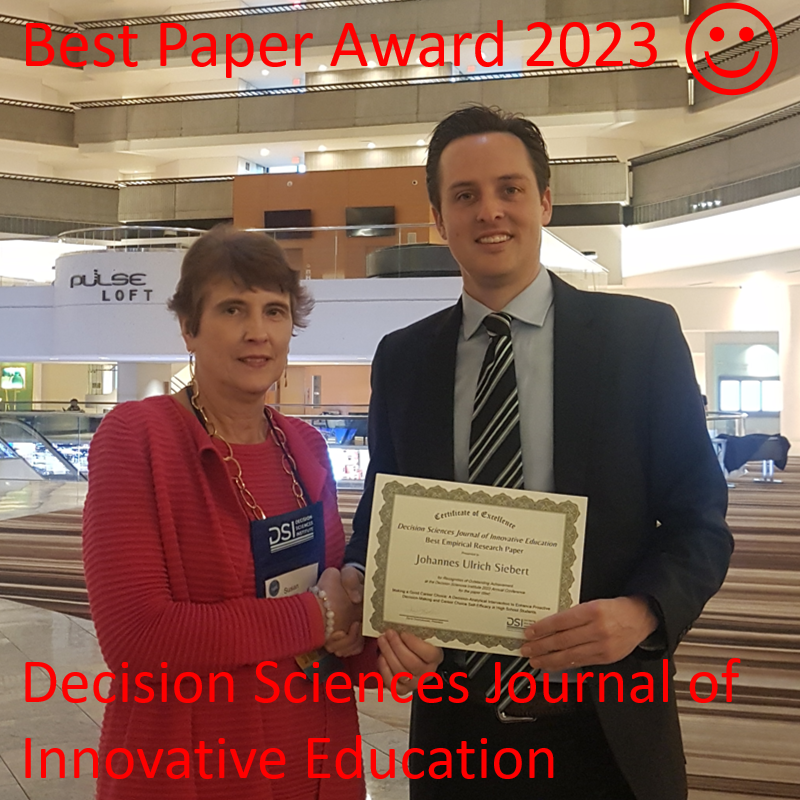
MCI-Prof. Johannes Siebert wins prestigious Best Paper Award
-

What is important when it comes to career guidance at school: researchers explain how best to support pupils in choosing a course of study or training
The drop-out rates among trainees and first-year students are high – on average, around one in four drop out again. Schools play a crucial role in providing career guidance. Prof. Dr. Johannes Siebert from the Management Center Innsbruck explains which mistakes should be avoided.
You can find the full, excellent article by Lena Sterz from Campus Schulmagazin here: https://www.campus-schulmanagement.de/magazin/was-bei-der-berufsorientierung-in-der-schule-wichtig-ist
-

“KLUGentscheiden!” research project: empowering high school students’ study and career choices
Making the right decisions in your own life is something that can be learned. The project “KLUGentscheiden!” at the University of Bayreuth shows: Young people who receive systematic training in decision-making skills shortly before leaving school consider their abilities and long-term interests far more thoroughly when choosing a course of study or vocational training than if they spontaneously follow their own wishes or simply trust the recommendations of others. In the coming weeks, the regional cooperation with selected schools that has been successfully established in the project will be further intensified and expanded.
The coordinator of “KLUG entscheiden!” is Prof. Dr. Johannes Siebert, who set up the project at the University of Bayreuth and now teaches and researches at the MCI Management Center Innsbruck. Dr. Manuel Friedrich, head of the didactics of economics at the University of Bayreuth, is responsible for the didactics. The project is financially supported by the Adalbert Raps Foundation, the Rainer Markgraf Foundation, and the Upper Franconia Foundation and will be continued until the end of 2024 in cooperation with the University of Bayreuth.
Decision-making training for students
Many years of research on the theory and practice of decision-making form the basis for sound advice to teachers as well as for the design and implementation of workshops with students. A study coordinated by Siebert and published in “Decision Sciences – Journal of Innovative Education” proves the effectiveness of two-day workshops in which students from upper secondary level vocational schools in the region participated.
The complete press release of the University of Bayreuth, written by Christian Wissler, can be found here.
-
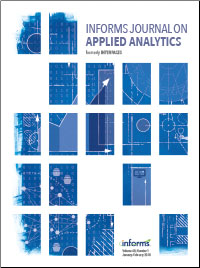
Applying Decision Analysis to Diverse Domains: An Introduction to the Special Issue
Decision analysis (DA) is one of the key tools in operations research (OR). DA is particularly effective at mapping the real world to the model representation to enable the application of formal analysis. DA is a flexible modeling paradigm that has existed since the 1960 s, based on statistical decision theory, elements of utility from economics, probability theory, dynamic programming, and stochastic programming. It aims to identify an optimal course of action for decision problems with uncertainties that affect outcomes and values. Optimal here means expected-utility maximizing, which decision theory shows to be equivalent to following axioms of rationality given a set of beliefs.
DA articles have appeared with some regularity in Interfaces (the predecessor to INFORMS Journal on Applied Analytics (IJAA)), with early applications focusing on policy and later ones on research and development in consumer products, pharmaceuticals, and oil and gas, quite naturally because these applications have distinct decision points when investments are continued or cut off (which is the meaning of the Latin root decidere). A 1992 special issue of Interfaces, “Decision and Risk Analysis,” highlighted applications that used rich representations of decision problems, such as influence diagrams as an abstraction of the decision tree, strategy tables to define complex alternatives, and practical techniques involving value-focused thinking and value hierarchies to implement multiattribute utility theory.
All these developments help capture the knowledge and concerns of problem owners through model specification and judgment elicitation. In addition, DA models often interface with or subsume separate sophisticated technical or financial models. And DA representations aid in communicating the implications of models via, for example, tornado charts, portfolio diagrams, cumulative distributions, and risk profiles.
In recent years, DA has added sophisticated computational abilities. Although to this day many DA applications ultimately reduce to decision tree calculations or the equivalent, software has improved to include modular graphical development that interfaces with spreadsheets and programming environments such as R and Python. Theory connected to DA also continues to advance, for example, group decision theory and extensions of utility theory to multiparty situations in which considerations such as equity are important. There is a substantial amount of adjacent computerintensive work on Bayes nets, machine learning, and inference. The science of elicitation has grown exponentially, ranging from increased understanding of judgmental biases, wisdom of crowds, and other ways to combine judgments of multiple experts to increased mathematical and computational sophistication, most recently advancing with copulas to represent correlations of different natures between variables. As seen in this issue, DA is increasingly well linked with other OR techniques, such as math programming for portfolio DA, leading to innovations in scholarship and practice. Thus, DA is an exciting field of interest to IJAA readers on its own merits but also as a field that can add value to other areas of OR.
Saurabh Bansal, Jeffrey M. Keisler, Johannes U. Siebert, Karen E. Jenni (2023) Applying Decision Analysis to Diverse Domains: An Introduction to the Special Issue. INFORMS Journal on Applied Analytics 53(3):173-177. https://doi.org/10.1287/inte.2023.1163
-
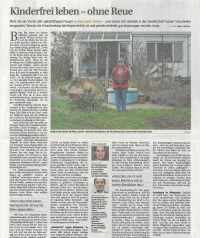
About a literally life-changing decision: children, yes or no?
The decision to what extent one wants to have children has significant consequences for the individual, the couple, and the family. That’s why it’s a decision that needs to be thought about carefully. In the Sunday edition of Die Presse, I give some advice for this particular decision. You can find Ms. Gabriel’s article, which is well worth reading, here: https://www.diepresse.com/6238448/kinderfrei-leben-ohne-reue
I recommend making decisions proactively and taking your own destiny into your own hands as your decision architect. I explain this background in this #TEDxTalk: https://www.ted.com/talks/johannes_siebert_nudge_yourself_to_make_better_decisions, which has been well received and already has over 150,000 views and 5,000 likes; I am happy about every additional view and like😊.
For even more interested on the topic, check out this free MOOC Smart Decisions (https://imoox.at/course/smartentscheiden). Those even more interested in deciding to what extent to have children will find further input in an interview in the Standard from August 2022. You can find the article here: https://www.derstandard.at/story/2000137561015/wie-werde-ich-mir-klar-ob-ich-kinder-will
-
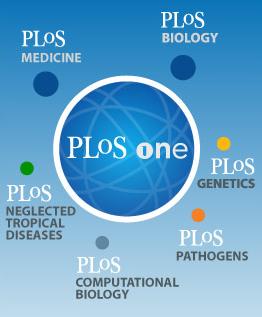
Reducing the impact of misinformation and fake news
New methods to effectively reduce the negative impact of misinformation and fake news on people’s opinions
An investigation into Team Jorge’s activites has shown the sinister influence of misinformation and fake news on politics, society and the economy. Misinformation and fake news became a global phenomenon with the 2016 U.S. presidential election and the Brexit referendum, particularly because more and more people are using social media as a source of news without reflection. The use of artificial intelligence (e.g. chat GPT) in the generation and dissemination of misinformation and fake news will strengthen their influence in the future.The spread of misinformation and fake news on the internet and its consequences are being intensively discussed in the European Parliament. Nevertheless, so far, there is no clear agreement on how to reduce the influence of misinformation and fake news.
“The problem with misinformation and fake news is that even if it is flawlessly identified as such, something still ‘sticks’ – the misinformation and fake news continue to influence our opinion, explains Prof. Johannes Siebert who researches and teaches at MCI | The Entrepreneurial School®. This phenomenon is called “belief perseverance bias“ and explains the great influence of misinformation and fake news on the formation of opinion and the decision-making behavior of many people. “There are numerous newsrooms and nonprofit organizations that identify misinformation and fake news. This very elaborate work helps reduce the influence of misinformation and fake news. However, these fact checks can only be a first step,“ adds Dr. Jana Siebert.
The two researchers have been working on the methodological reduction of the belief perseverance bias in the context of misinformation and fake news in the project “PerFake“ funded by the European Union and the Czech Ministry of Education, Youth and Sports. The aim of the PerFake project was to contribute to reducing the negative influence of misinformation and fake news. Prof. Johannes Siebert and Dr. Jana Siebert developed two methods to reduce the belief perseverance bias and tested and optimized them in two experiments with numerous participants. The first results have been published in the prestigious journal PLoS ONE.
Both tested debiasing methods showed promising results in reducing the belief perseverance bias. The debiasing method “counter-speech“ focuses on refuting the misinformation and fake news by clear counter-arguments. The debiasing method “awareness training“ generally informs the participants about the existence of the belief perseverance bias and how the bias works. Such awareness training could help increase society’s resilience to misinformation and fake news. Prof. Johannes Siebert explains how this can work in practice: “Let us assume you have received a piece of information, for example, you have heard a speech by a politician or read a post on social media. A fact check shows that it is fake news. Being aware of the belief perseverance bias should then help you realize that your original opinion may still be negatively influenced by the fake news and subsequently correct this bias.“ Dr. Jana Siebert adds: “It would, therefore, be desirable to educate the public about the belief perseverance bias and the way it works. For example, fact-checking organizations could complement their fact checks with a note informing about the belief perseverance bias. Such a note could significantly increase the effectiveness of fact-checking and society’s resilience to misinformation and fake news.“
See also: https://www.mci.edu/en/news-filter-en/228-researchnews/4845-reducing-the-impact-of-misinformation-and-fake-news
Source:
Siebert, J., & Siebert, J. U. (2023). Effective mitigation of the belief perseverance bias after the retraction of misinformation: Awareness training and counter-speech. PLoS ONE 18(3): e0282202. https://doi.org/10.1371/journal.pone.0282202
-
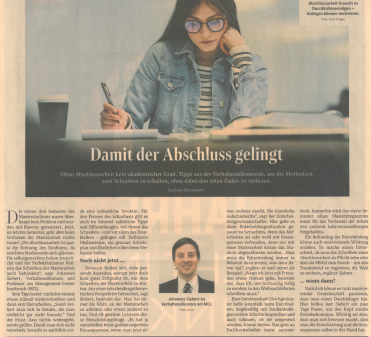
How to finish a bachelor or master thesis successfully
Many students struggle to finish their thesis. In this weekend’s edition of the Standard, I share some tips on how you can outsmart yourself to finally finish your thesis or dissertation. However, the tips are applicable to almost any task you might be putting off. You can find Ms. Ostermann’s article, which is well worth reading, here.
The basic idea of the extension of classical nudging is to be your own decision architect. I explain the background in this #TEDxTalk: https://www.ted.com/talks/johannes_siebert_nudge_yourself_to_make_better_decisions
If you’re even more interested in the topic, you’ll find enough exciting material for the football-less, rainy pre-Christmas season in this free MOOC Smart Decisions (https://imoox.at/course/smartentscheiden) In the weekend edition of the Standard, I give decision-theoretically sound tips on how to finally finish your final paper
-

“Smart decisions make you really happy”: MCI MOOC top-rated course on iMooX
Smart decisions make people really happy! Within the first nine months, 650 satisfied participants have already learned how to actively make them in our MCI MOOC “Smart Decisions” by Prof. Johannes Siebert. The MOOC is the best-rated course among over 100 courses on the iMooX platform and has a rating of 4.98 out of 5.00 stars.
The core of the free MOOC consists of 8 interactive videos with a total length of just over 2.5 hours. In addition, more in-depth teaching materials, reflection exercises and quizzes are provided. Participants are also encouraged to work on their own running example(s).
Prof. Siebert explains why many people make bad decisions and how they can avoid that. He presents some simple but effective methods based on recent developments in behavioral economics and decision sciences. The participants learn to make reflective and conscious decisions. Therefore, Prof. Siebert enables the participants to become their own so-called decision architects. A short summary of this concept can be found in the TEDxTalk „Nudge yourself to make better decisions“ by Prof. Siebert.
The methods presented are basically suitable for almost all decisions. Since career decisions are highly relevant not only for students, Prof. Siebert explains the methods consistently on career decisions. In particular, he focuses on the choice of jobs after graduation.
The advantages of a MOOC are particularly evident in self-directed learning. Learners can plan, design and evaluate their learning process independently. This is a key competence that is indispensable for lifelong, successful learning. Teachers can also actively promote self-directed learning in the classroom by working with authentic and realistic problems or projects, for example. Instead of directly teaching the theoretical and practical principles, they let the students work independently. This also motivates them to take on new and complex challenges.
So, what do students say about this form of learning? What do they particularly like about it? Here are a few reviews from our MCI MOOC.
“The explanations in the videos were easy to understand and could immediately be applied. The flexibility of location and time of online courses is the biggest advantage of a course like that.”
“Content well structured, good mix of learning and applying, understandably formulated and comprehensible.”
“The clear, entertaining food for thought and the tasks for reflection on this, based on own objectives.”
“The great revision through the breaks/interruptions in the videos as well as the incorporated questions – pretty cool!”
If you are interested, you can sign up for the free MOOC here.
Why should you address your ability to make good decisions? Those who make good decisions are subsequently more satisfied with their lives. In addition, a research team led by Prof. Siebert was able to empirically prove that good, proactive decision-making can be increased through decision-making training such as lectures or a MOOC. More information on this can be found here. Taken together, research indicates that students in courses taught by Prof. Siebert at the Entrepreneurial School® not only learn to make more proactive decisions, but as a result, are more satisfied with their lives.
We invite you to make use of the fascinating proactive decision-making in our attractive study programs (BA Wirtschaft & Management for Professionals, BA Business & Management, and MA International Business & Management) to accelerate your personal and academic development as well as your professional career.
„MCI MOOC “Smart Decisions” top-rated MOOC“, News of the Research Area Innovation, Entrepreneurship & Marketing at MCI | THE ENTREPRENEURIAL SCHOOL®, 3rd of October 2022 (link)
-
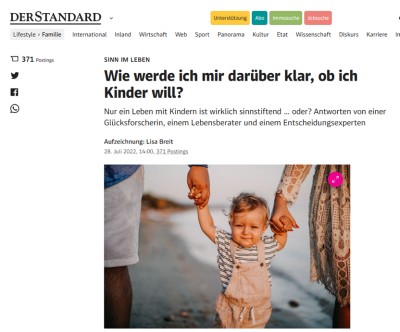
How do I get clear about whether I want kids?
The ideal of a large family with children still exists. But many people today are unsure whether they really want that. They may be in their 20s or 30s, their friends are having babies, and they imagine what it will be like. They observe beaming but stressed parents. And they themselves haven’t made up their minds yet – because they’re actually quite happy with the way their lives are right now. At the same time, there’s the fear of missing out. How do you find out what’s right?
Lisa Breit spoke with experts from various disciplines about this question: Johannes Siebert is a decision researcher, Melanie Hausler is a psychologist and happiness researcher, and Johannes Frass is a life coach and budding psychotherapist in Vienna. They explain how to make the decision and whether children really do make you happier.
You can find the article in the Standard here: https://www.derstandard.at/story/2000137561015/wie-werde-ich-mir-klar-ob-ich-kinder-will
-

The research project PerFake explores methods to reduce the influence of fake news on individuals
Fake news became a global phenomenon with the 2016 U.S. presidential election and the Brexit referendum, particularly because more and more people are using social media as a source of news without reflection. The spread of fake news on the Internet and its consequences are being intensively discussed in the European Parliament. Nevertheless, so far, there is no clear agreement on how to reduce the influence of fake news.
„The problem with fake news is that even if it is flawlessly identified as such, something still „sticks“ – the fake news continues to influence our opinion”, explains Prof. Johannes Siebert, who researches and teaches at MCI | The Entrepreneurial School®. This phenomenon is called „belief perseverance bias“ and explains the great influence of fake news on the formation of opinion and the decision-making behavior of many people. „There are numerous newsrooms and nonprofit organizations that identify fake news. This very elaborate work helps reduce the influence of fake news. However, these fact checks can only be a first step,“ adds Dr. Jana Siebert from the Palacky University Olomouc in the Czech Republic.
The two researchers have been working on the methodological reduction of the belief perseverance bias in the context of fake news in the project „PerFake“ funded by the European Union and the Czech Ministry of Education, Youth and Sports. The aim of the PerFake project was to contribute to reducing the negative influence of fake news. Prof. Johannes Siebert and Dr. Jana Siebert developed two methods to reduce the belief perseverance bias and tested and optimized them in two experiments with numerous participants. The experiments consisted of three main steps. Participants were (1) confronted with fake news, (2) informed that it was fake news, and (3) confronted with methods to reduce the bias. At each step, participants’ opinion was measured to determine the bias and analyze the effectiveness of the methods to reduce that bias.
Both tested debiasing methods showed promising results in reducing the belief perseverance bias. The debiasing method „counter-speech“ focuses on refuting the fake news by clear counter-arguments. The debiasing method „awareness training“ generally informs the participants about the existence of the belief perseverance bias and how the bias works. Such awareness training could help increase society’s resilience to fake news. Prof. Johannes Siebert explains how this can work in practice: „Let us assume you have received a piece of information, for example, you have heard a speech by a politician or read a post on social media. A fact check shows that it is fake news. Being aware of the belief perseverance bias should then help you realize that your original opinion may still be negatively influenced by the fake news and subsequently correct this bias.“ Dr. Jana Siebert adds: „It would, therefore, be desirable to educate the public about the belief perseverance bias and the way it works. For example, fact-checking organizations could complement their fact checks with a note informing about the belief perseverance bias. Such a note could significantly increase the effectiveness of fact-checking and society’s resilience to fake news.“
Source: „Reduktion des Einflusses von Fake News“, News des Forschungsschwerpunks Innovation, Entrepreneurship & Marketing at MCI | THE ENTREPRENEURIAL SCHOOL®, 24th of February 2022 (link)